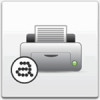Lexmark Dot Matrix Technical Reference - Page 120
x Printers, Designing and Downloading Characters - printer definition
 |
View all Lexmark Dot Matrix manuals
Add to My Manuals
Save this manual to your list of manuals |
Page 120 highlights
249x Printers Designing and Downloading Characters The text that follows shows you how to design and download characters for the 249x printers. The definitions use binary and hexadecimal notation. The examples are in the program format shown on page 16. Note: Download fonts must be reloaded after a power off/on cycle. Downloading a New Font The first step in downloading a new font is designing and creating the character data for the characters in the font. You can download up to 256 characters. You may share resident characters by loading the lookup table entry with the address of the resident character and setting bit 6 in attribute byte 1 to 1. This code indicates a resident character. Set the other bytes of the lookup table entry appropriately. After selecting the characters you want to download and those you want to use from the resident fonts, you must create the character data and download it. Next, you must download the lookup table, being careful to use the correct addresses and masks for any shared characters. The first downloadable address is x800C. This address is the first (high) byte of a 2-byte code page ID. The second (low) byte is stored at x800D. A zero code page ID lets you switch between the resident fonts and downloaded fonts with the ESC I command, Select Print Mode. If the code page ID of the download font is not zero and does not match the selected resident font, then a Set Code Page command is required to select the font. Note: The ESC = 00 command copies the current code page to the code page ID. Address x800E and x800F are reserved and you should set them to zero. The first lookup table must always begin at address x8010. If a second lookup table is present, it must begin at x8911. A third and fourth lookup table should begin at x9212 and x8B13, respectively. Four is the maximum number of lookup tables that may be accessed. Character data can begin at address xA414 or greater. The first byte of any lookup table is the font descriptor byte. This byte should not be changed unless you are downloading a new lookup table. Changing this byte does not change the font characteristics. If the font descriptor byte does not match the characteristics of the font you have downloaded, the characters are unrecognizable when printed. The font descriptor byte identifies the default font. (The first font marked default is chosen if no user-defined default has been stored using the operator panel menu.) This byte also tells if another lookup table follows this one and identifies the quality of the font. If the default font has a non-zero code page ID, that code page ID becomes the active code page when the printer is switched 120 Section 7: Downloading Characters and Fonts















